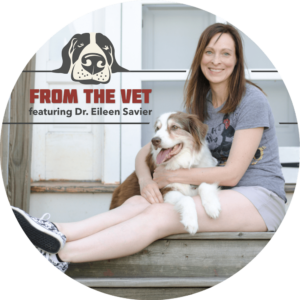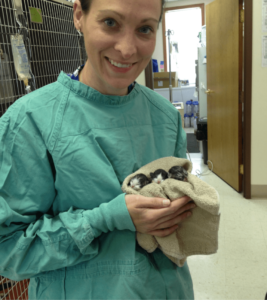[vc_row][vc_column][trx_section box=”yes”][trx_title align=”center” color=”#d9ae4c” weight=”700″]
When Your Pup Can’t Breath
[/trx_title][trx_title align=”center” color=”#d9ae4c” weight=”700″]
Tracheal Collapse in Dogs
[/trx_title][trx_title type=”4″ align=”center” color=”#434544″ weight=”700″ bottom=”mini”]by Dr. Eileen Savier CVA, CVCH[/trx_title][vc_column_text]

I’m not sure anything is scarier in our animals than the idea of them struggling to breath… the idea of them gasping for air… something that should come so easily becoming labored and a struggle… but it can happen and one of the most common causes is tracheal collapse.
What is it?
A tracheal collapse is a very common disorder of the tracheal rings. It occurs when the tracheal rings flatten and the membrane sags into the lumen – disturbing the flow of air into and out of the lungs.
What causes a tracheal collapse?
The causes of a tracheal collapse are complex and multifactorial. Potential factors are, but are not limited to, obesity, heart disease, inhalation of irritants (second hand smoke, allergens, harsh chemicals, etc.), dental disease, respiratory infections, and/or recent endotracheal intubation (breathing tube used for anesthesia).
What will I see (or hear) at home?
In the veterinary world, we have a very technical term for the cough that often indicates a collapse of the trachea. We refer to it as the “goose-honk” (specific and actually VERY accurate). When coupled with other potential risk factors – dogs that are typically middle to older aged; miniature, toy or small breeds; or over represented breeds (such as Yorkshire Terriers, Pomeranians, Pugs, Poodles, Maltese, and Chihuahuas) and a chronic cough – it is one of the first diagnoses that should be investigated. You may notice that the cough is harsh and pups may present with mild to severe panting, exercise intolerance, and varying degrees of breathing difficulty. Activity, excitement, pulling on a leash, drinking, or heat stress usually precipitates coughs. (Just to note – there are MANY other causes of coughing including heart disease, bronchitis, and fibrosis. The complication is that all of these diseases can occur with a collapsing trachea as well.
How do we get our pup a diagnosis?
When diagnosis is strongly suspected – based on signalment, history of cough, and physical exam findings – additional diagnostics, such as x-rays or endoscopy – are often used. Since some tracheal collapses are not apparent on x-rays, endoscopy (using sedation and passing a camera into the trachea to visualize the trachea in motion) is more often used. These also help evaluated for other disease and can determine the size of the heart as well.
Treatment
Medical management is preferred and approximately 70% of dogs will respond – at least for a period of time. This disease is progressive and if the dog is struggling to breath, surgery may be the only option. Early identification of the disease and removal of any pollutants causing inflammation are crucial. As we have touched on before – in prior blogs – maintaining a healthful body weight is very important.
- Medical Management: Long-term management mainly aims to decrease all potential promoting factors and the level of inflammation of the trachea. Weight reduction in the obese animal is ESSENTIAL. Replacement of neck collars with harnesses can also be helpful. Removing the dog from respiratory irritants such as smoke and dust (even scented candles and perfumes) can yield great results. Medications can include inhaled steroids, sedatives, and antihistamines – used to reduce stress and inflammation. Cough suppressants are some relief as well. Most animals can improve with an individualized treatment plan, but the condition is usually progressive. If a dog fails medical management, then surgery may be an option.
- Surgical Option (Tracheal Stent): Tracheal collapse may also be treated by placing a stent (s spring like device) inside the airway to hold the trachea open. Stents allow treatment of tracheal collapse in the neck or within the chest without a surgical incision. As with any surgery, there are potential complications. Many dogs will continue to cough for the rest of their lives, though the cough is usually milder than before treatment. Some dogs will continue to have clinical signs of collapse as the disease progresses into the small airways (bronchial collapse). Stents placed in the airway can also contribute to irritation and coughing. If enough irritation occurs, the dogs can develop thick tissue in front of or behind the stent and it will block the airway. Stents that span the thoracic inlet, where the trachea enters the chest are a risk of breaking due to movement in this area. Stents that are too small can move within the trachea.
[/vc_column_text][/trx_section][/vc_column][/vc_row][vc_row css=”.vc_custom_1533135180690{margin-top: 40px !important;}”][vc_column css=”.vc_custom_1533134942241{background-color: #d9ae4c !important;}”][trx_title type=”2″ align=”left” color=”#f6f2e4″ left=”20″ right=”20″]About Dr. Eileen Savier[/trx_title][vc_column_text css=”.vc_custom_1533135315368{padding-right: 20px !important;padding-bottom: 30px !important;padding-left: 20px !important;}”] Barks & Recreation is proud to feature Dr. Eileen Savier CVA, CVCH as our Veterinary Blogger in our “From the Vet” Series. Currently part of the team of doctors at Keystone Veterinary Clinic, Dr. Savier is a 2012 Graduate of the Ross University School of Veterinary Medicine, She completed her clinical experience at The Ohio State University and after veterinary school she pursued further education and certification in Veterinary Acupuncture, Chinese Herbal Medicine, and Fear Free veterinary visits. Dr. Savier has a special interest in integrative medicine, animal behavior, and internal medicine and is committed to improving animal health care by integrating Eastern and Western philosophies. She enjoys working with fearful & aggressive dogs and cats and she has had additional training in low stress handling techniques and encourages positive reinforcement during exams and procedures. Her clinical interests include pain management, animal behavior, geriatric patient care, and internal medicine. Dr. Savier is a member of the following associations:
Barks & Recreation is proud to feature Dr. Eileen Savier CVA, CVCH as our Veterinary Blogger in our “From the Vet” Series. Currently part of the team of doctors at Keystone Veterinary Clinic, Dr. Savier is a 2012 Graduate of the Ross University School of Veterinary Medicine, She completed her clinical experience at The Ohio State University and after veterinary school she pursued further education and certification in Veterinary Acupuncture, Chinese Herbal Medicine, and Fear Free veterinary visits. Dr. Savier has a special interest in integrative medicine, animal behavior, and internal medicine and is committed to improving animal health care by integrating Eastern and Western philosophies. She enjoys working with fearful & aggressive dogs and cats and she has had additional training in low stress handling techniques and encourages positive reinforcement during exams and procedures. Her clinical interests include pain management, animal behavior, geriatric patient care, and internal medicine. Dr. Savier is a member of the following associations:
- American Veterinary Medical Association (AVMA)
- International Veterinary Academy of Pain Management (IVAPM)
- American Association of Feline Practitioners (AAFP)
- American Veterinary Society of Animal Behavior (AVSAB)
- American Association of Traditional Chinese Veterinary Medicine (AATCVM)
- Ohio Veterinary Medical Association (OVMA)
Dr. Savier shares her home with two (soon to be three) dogs, two cats, and a toddler. She lovingly refers to her two dogs as Coconut Retrievers as they were rescue dogs she brought home from the island of St. Kitts. In her free time she enjoys spending time with her family, going to the beach, and planning her next Disney vacation.
Join us every month for Dr. Savier’s “From the Vet” series to get more information related to the health and welfare of your furry family members![/vc_column_text][/vc_column][/vc_row]



